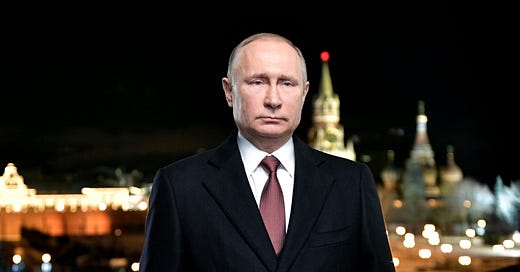Putin Is Quarantining. What Would Happen If He Died?
Like most autocrats, he has no successor lined up.
Russian President Vladimir Putin is reportedly self-quarantining after several members of his inner circle were diagnosed with COVID. But don’t rejoice yet: Kremlin spokesman Dmitry Peskov reports that the 68-year-old autocrat is “absolutely healthy.”
Putin is also vaccinated against the coronavirus, allegedly with Russia’s Sputnik V vaccine, although that was only announced months after he received two doses out of the public eye. It wouldn’t be surprising if he had opted for the more reliable Western shots. Assuming it’s true that he was vaccinated, he’s likely to be fine even if he experiences a breakthrough infection.
But his health scare does raise the question: What would happen if Putin died?
Russia has a constitution, and that constitution provides that if the president of Russia resigns, becomes incapacitated, or dies, the prime minister becomes acting president. This is, formally at least, how Putin became president the first time, upon the resignation of Boris Yeltsin on December 31, 1999, before winning election in his own right in 2000. But as with almost all politics in Russia, the formalities matter less than the informalities.
In an important sense, Putin has and can have no successor. Like almost every Russian leader before him dating back to the Bolshevik Revolution, he has redefined the job of Russian leader according to his own personality, preferences, and situation. Lenin’s leadership of the revolutionary party was markedly different from Stalin’s totalitarian nightmare (though it did establish the precedents for it). Khrushchev’s reformist revisionism and anti-Stalinism represented yet another change. Brezhnev presided for nearly two decades over a system of collective, consensus-driven decision-making at the top of the state-party system, to the point that in his senility, senior party leaders disguised his hospital room so the people of the Soviet Union wouldn’t know he was sick. Gorbachev attempted to return to the pre-Brezhnev system of supreme control when instituting glasnost and perestroika, only to wind up with a schism in the party, an attempted military coup, and his country dissolving underneath him. Yeltsin largely defined the concept of the “president of Russia,” having been the first to hold the post under both the Soviet system and the new Russian constitution. Part of his definition included election campaigns driven by oligarchs and shelling the legislature.
Putin redefined the job yet again. Under his leadership, the president is the maker and breaker of oligarchs, the master of information and repression in Russia, the capo di tutti capi of the massive system of corruption that bleeds the Russian economy dry, and as he would have it, the embodiment of the Russian people and worldwide leader of anti-liberalism.
Putin is the one man in Russia capable of balancing the security agencies, the oligarchs, the technocrats, and the regional power brokers against each other (and he has helped ensure considerable overlap among these groups as part of the balancing act). Like the keystone of an arch, if he were to disappear, the entire system would collapse. There are benefits to such a system—it’s kept him in absolute power for more than two decades, even during his stint as prime minister from 2008-2012, a brief pseudo-interregnum when he felt he had to at least make a show of caring about constitutional niceties—but it comes at a cost, as well. Retirement isn’t an option.
Whoever Putin’s successor winds up being, he won’t be able to do the exact same job because, like Putin’s expensive suits, the job description of “president of Russia” is tailored precisely to the former KGB colonel, regardless of what the constitution says. The next man to hold the office will have to reinvent the job yet again for a new era.
When Putin goes—be it tomorrow or in 25 years—the world’s largest nuclear power will have to reinvent most of its political system. And that process is likely to be messy, contentious, and dangerous for both Russia and the world.











